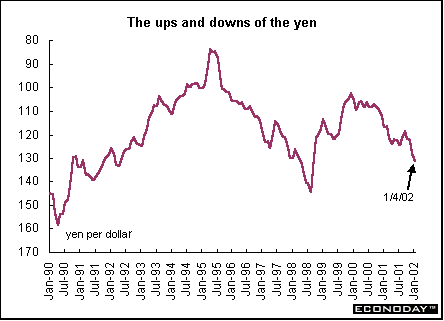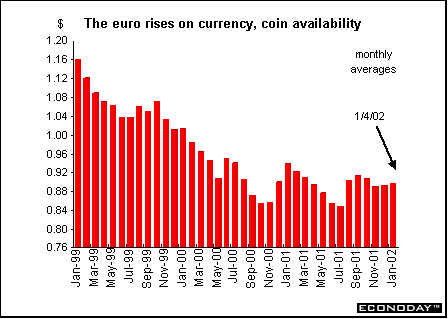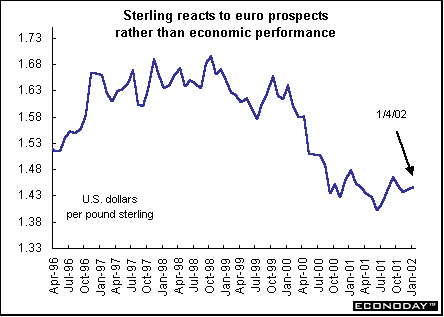 |

Currencies
The yen had its biggest annual decline against the dollar since 1979 on expectations Japanese officials will continue to let the currency weaken to help the economy recover from recession. Japan's currency declined four straight weeks at year-end as officials signaled it was too strong given the weakness of the economy. The drop accelerated during the last days of 2001, to a three year low against the dollar and a two year low against the euro, after the unemployment rate climbed to the highest level in half a century and bankruptcies reached a 17-year high. A major driver behind the weaker yen has been the so-called benign neglect by Japanese policy makers, who have suggested they will allow the currency to fall to help boost exports. As long as these types of comments emerge, investors are comfortable selling yen. But now officials have grown a bit nervous that the yen might fall too far and are beginning to stress the need for a stable yen, timing their comments during bouts of yen buying to increase the currency's gains. The yen rose at week's end as a result. Other Asian countries fret when the yen falls because of the cascading impact on the value of their own currencies.

The euro rose against the dollar in the first trading day of the year after falling 5.2 percent during 2001. The introduction of notes and coins boosted demand for the currency as markets reacted positively to the thus far smooth rollout. The introduction is being heralded as an event of immense psychological benefit to the euro. From a logistical point of view, it seems to have been very successful. The euro also rose against the British pound and Swiss franc. However, the rise could be a one day wonder as it slid once again on Thursday and Friday after the ECB left policy making interest rates on hold at 3.25 percent.

The British pound sterling continues to drift lower against the U.S. dollar in tandem with the euro. Immediately after Tony Blair's reelection as prime minister, sterling fell as foreign exchange traders assumed that Britain would join the EMU. It took awhile for traders to believe that it wouldn't happen so quickly. But the currency, when trading against the U.S. dollar, continues to track the ups and downs of the euro. Just as the U.S. dollar hasn't fallen even though the economy is in recession, the pound sterling hasn't risen despite Britain's superior economic performance. In fact, just as the high value of the dollar has hurt U.S. exports, so too has the high value of sterling driven the British manufacturing sector into recession. Trade with EMU countries has been hurt especially given that they are Britain's largest trading partners.



Introduction • Global Stock Market Indexes • Recap of Global Markets • Currencies • Indicator Scoreboard

The Bottom Line • Looking Ahead
|
 |